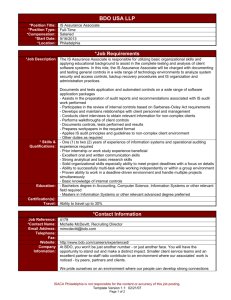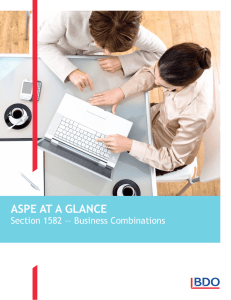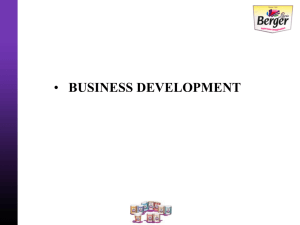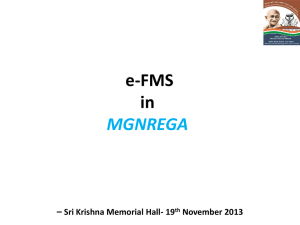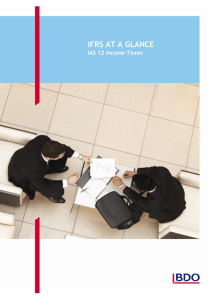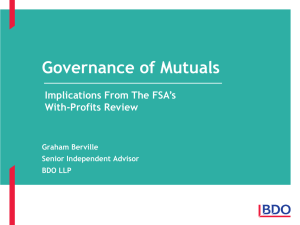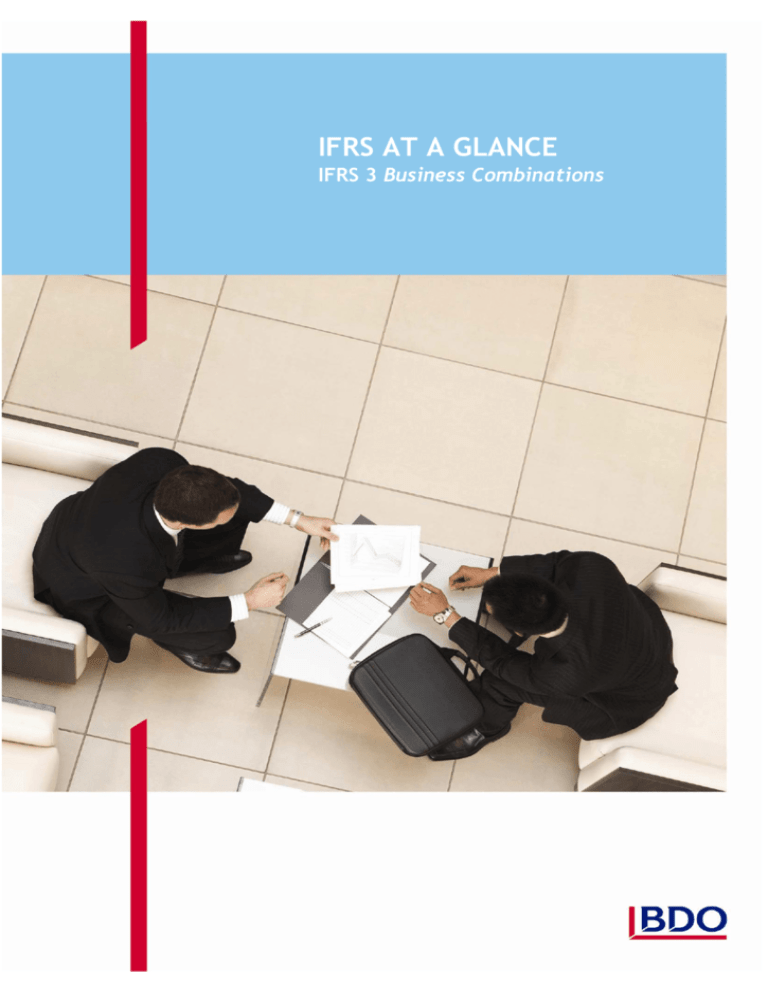
IFRS AT A GLANCE
IFRS 3 Business Combinations
As at 1 July 2015
IFRS 3 Business Combinations
Effective Date
Periods beginning on or after 1 July 2009
IDENTIFYING A BUSINESS
COMBINATION / SCOPE
A business
combination is:
Transaction or event
in which acquirer
obtains control over
a business (e.g.
acquisition of shares
or net assets, legal
mergers, reverse
acquisitions).
IFRS 3 does not apply to:
The accounting for the
formation of a joint
arrangement in the
financial statements of
the joint arrangement
itself.
Acquisition of an asset
or group of assets that
is not a business.
A combination of
entities or businesses
under common control.
Definition of “control of an investee”
An investor controls an investee when the investor is
exposed,quantitative
or has rights, todisclosure
variable returns
from its
Specific
requirements:
involvement with the investee and has the ability to
affect those returns through its power over the
investee.
Control (refer to IFRS 10)
Ownership of more than half the voting right of
another entity
Power over more than half of the voting rights by
agreement with investors
Power to govern the financial and operating
policies of the other entity under statute/
agreement
Power to remove/appoint majority of directors
Power to cast majority of votes.
Definition of a “Business”
Integrated set of activities and assets
Capable of being conducted and managed to
provide return
Returns include dividends and cost savings.
Acquisition Costs
Cannot be capitalised, must instead be expensed
in the period they are incurred
Costs to issue debt or equity are recognised in
accordance with IAS 32 and IFRS 9.
ACQUISITION METHOD
A business combination must be accounted for by applying the acquisition method.
STEP 1: IDENTIFY ACQUIRER
IFRS 10 Consolidated Financial Statements is used to
identify the acquirer – the entity that obtains control
of the acquiree.
STEP 4: RECOGNITION AND
MEASUREMENT OF GOODWILL OR A
BARGAING PURCHASE
Goodwill is recognised as the excess between:
- The aggregate of the consideration transferred,
any non-controlling interest in the acquiree
and, in a business combination achieved in
stages, the acquisition-date fair value of the
acquirer’s previously held equity interest in the
acquiree
- The identifiable net assets acquired (including
any deferred tax balances)
Goodwill can be grossed up to include the
amounts attributable to NCI
A gain from a bargain purchase is immediately
recognised in profit or loss
The consideration transferred in a business
combination (including any contingent
consideration) is measured at fair value
Contingent consideration is either classified as a
liability or an equity instrument on the basis of
IAS 32 Financial Instruments
Contingent consideration that is within the scope
of IFRS 9 (classified as a financial liability) needs
to be remeasured at fair value at each reporting
date with changes reported in profit or loss.
STEP 2: DETERMING THE
ACQUISITION DATE
The date which the acquirer obtains control of
the acquiree.
STEP 3: RECOGNITION AND
MEASUREMENT OF ASSETS,
LIABILITIES AND NONCONTROLLING INTERESTS (NCI)
As of the acquisition date, the acquirer
recognises, separately from goodwill:
- The identifiable assets acquired
- The liabilities assumed
- Any NCI in the acquiree
The acquired assets and liabilities are required
to be measured at their acquisition-date fair
values
NCI interests that are present ownership
interests and entitle their holders to a
proportionate share of the entity’s net assets
in the event of liquidation (e.g. shares) are
measured at acquisition-date fair value or at
the NCI’s proportionate share in net assets
All other components of NCI (e.g. from IFRS 2
Share-based payments or calls) are required to
be measured at their acquisition-date fair
values
There are certain exceptions to the
recognition and/or measurement principles
which cover contingent liabilities, income
taxes, employee benefits, indemnification
assets, reacquired rights, share-based
payments and assets held for sale.
ADDITIONAL GUIDANCE FOR APPLYING
THE ACQUISITION METHOD
STEP ACQUISTION
An acquirer sometimes obtains control of an acquiree
in which it held an equity interest immediately before
the acquisition date. This is known as a business
combination achieved in stages or as a step acquisition
Obtaining control triggers re-measurement of previous
investments (equity interests)
The acquirer remeasures its previously held equity
interest in the acquiree at its acquisition-date fair
value. Any resulting gain/loss is recognised in profit or
loss.
BUSINESS COMBINATION WITHOUT
TRANSFER OF CONSIDERATION
The acquisition method of accounting for a business
combination also applies if no consideration is
transferred.
Such circumstances include:
- The acquiree repurchases a sufficient number of its
own shares for an existing investor (the acquirer) to
obtain control
- Minority veto rights lapse that previously kept the
acquirer from controlling an acquiree in which the
acquirer held the majority voting rights
- The acquirer and the acquiree agree to combine
their businesses by contract alone.
SUBSEQUENT MEASUREMENT AND
ACCOUNTING
In general, after the date of a business combination an
acquirer measures and accounts for assets acquired
and liabilities assumed or incurred in accordance with
other applicable IFRSs.
However, IFRS 3 includes accounting requirements for
reacquired rights, contingent liabilities, contingent
consideration and indemnification assets.
For further information about how BDO can assist you and your organisation, please get in touch with one of our key contacts listed below.
Alternatively, please visit www.bdointernational.com/Services/Audit/IFRS/IFRS Country Leaders where you can find full lists of regional and
country contacts.
Europe
Caroline Allouët
Jens Freiberg
Teresa Morahan
Ehud Greenberg
Ruud Vergoossen
Reidar Jensen
Maria Sukonkina
René Krügel
Brian Creighton
France
Germany
Ireland
Israel
Netherlands
Norway
Russia
Switzerland
United Kingdom
caroline.allouet@bdo.fr
jens.freiberg@bdo.de
tmorahan@bdo.ie
ehudg@bdo.co.il
ruud.vergoossen@bdo.nl
reidar.jensen@bdo.no
m.sukonkina@bdo.ru
rene.kruegel@bdo.ch
brian.creighton@bdo.co.uk
Asia Pacific
Wayne Basford
Zheng Xian Hong
Fanny Hsiang
Khoon Yeow Tan
Australia
China
Hong Kong
Malaysia
wayne.basford@bdo.com.au
zheng.xianhong@bdo.com.cn
fannyhsiang@bdo.com.hk
tanky@bdo.my
Latin America
Marcelo Canetti
Luis Pierrend
Ernesto Bartesaghi
Argentina
Peru
Uruguay
mcanetti@bdoargentina.com
lpierrend@bdo.com.pe
ebartesaghi@bdo.com.uy
North America & Caribbean
Armand Capisciolto
Wendy Hambleton
Canada
USA
acapisciolto@bdo.ca
whambleton@bdo.com
Middle East
Arshad Gadit
Antoine Gholam
Bahrain
Lebanon
arshad.gadit@bdo.bh
agholam@bdo-lb.com
Sub Saharan Africa
Nigel Griffith
South Africa
ngriffith@bdo.co.za
This publication has been carefully prepared, but it has been written in general terms and should be seen as broad guidance only. The publication cannot be relied
upon to cover specific situations and you should not act, or refrain from acting, upon the information contained therein without obtaining specific professional
advice. Please contact your respective BDO member firm to discuss these matters in the context of your particular circumstances. Neither BDO IFR Advisory
Limited, Brussels Worldwide Services BVBA, BDO International Limited and/or BDO member firms, nor their respective partners, employees and/or agents accept
or assume any liability or duty of care for any loss arising from any action taken or not taken by anyone in reliance on the information in this publication or for any
decision based on it.
Service provision within the international BDO network of independent member firms (‘the BDO network’) in connection with IFRS (comprising International
Financial Reporting Standards, International Accounting Standards, and Interpretations developed by the IFRS Interpretations Committee and the former Standing
Interpretations Committee), and other documents, as issued by the International Accounting Standards Board, is provided by BDO IFR Advisory Limited, a UK
registered company limited by guarantee. Service provision within the BDO network is coordinated by Brussels Worldwide Services BVBA, a limited liability
company incorporated in Belgium with its statutory seat in Brussels.
Each of BDO International Limited (the governing entity of the BDO network), Brussels Worldwide Services BVBA, BDO IFR Advisory Limited and the member
firms is a separate legal entity and has no liability for another such entity’s acts or omissions. Nothing in the arrangements or rules of the BDO network shall
constitute or imply an agency relationship or a partnership between BDO International Limited, Brussels Worldwide Services BVBA, BDO IFR Advisory Limited and/
or the member firms of the BDO network.
BDO is the brand name for the BDO network and for each of the BDO member firms.
© 2015 BDO IFR Advisory Limited, a UK registered company limited by guarantee. All rights reserved.
www.bdointernational.com

